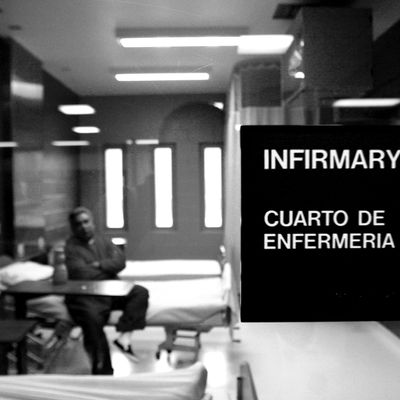
A Honduran woman detained at the Port Isabel Immigration and Customs Enforcement detention center went into premature labor last week and gave birth to a stillborn baby, according to a statement released by ICE. The 24-year-old woman’s identity is being withheld by authorities at this time.
According to ICE, the woman was six months pregnant when she was detained by U.S. Border Patrol in Hidalgo, Texas, on February 18. USBP claims that the woman was taken to a hospital and given an examination before being transferred to ICE custody on February 22. Then, according to the statement, the woman “began complaining of abdominal discomfort.”
The agency says that she was then examined by the ICE Health Service Corps before EMS was called. ICE claims that in this process, the woman announced that the baby was coming, and then “she went into premature labor, at 27 weeks pregnant, and delivered an unresponsive male infant.” The woman and the baby were taken to a hospital 27 miles away, where “the infant was later pronounced dead.”
In the same statement that detailed the woman’s detention and premature labor, ICE explained that “for investigative and reporting purposes, a stillbirth is not considered an in-custody death.” They linked to their policies about their treatment of pregnant women they detain, which states they are “committed to identifying providing appropriate care for pregnant detainees in ICE custody.”
The detention center that the woman was transferred to, Port Isabel, has a long history with substandard care. In July of 2018, it was described as “a criminal detention facility,” by Congresswoman Elizabeth Esty to the Texas Tribune. The facility was designated as the primary location for family reunification last summer, and at that time it was reported that Port Isabel had a decades long record of insufficient medical care, abuse, and horrible living conditions.
The current conditions of Port Isabel are unknown.
Prior to the Trump administration, pregnant detainees were often released from detention, especially those who were in their third trimester. But a January 2017 directive “ended the presumption of release for all pregnant detainees.” Now detention of pregnant women is determined on a case-by-case basis — though ICE maintains that access to care on and off site is available to all detained pregnant women.
ICE has been repeatedly accused of mistreating the pregnant women in their custody, in facilities where reports of extreme emotional distress, severe illness, and death are not uncommon. In 2017, a joint complaint was filed by seven organizations against the agency for the treatment of pregnant women they detained. Complaints against ICE included women who say they were ignored while bleeding and pleading for medical care, women having painful and unwanted miscarriages, and some pregnant women choosing to be deported, for fear of losing their baby while in detention.
Updated on 2/28/19 at 6:30 p.m.
On February 28, the Associated Press reported that the unnamed woman was released from ICE detention into family custody. According to Ana Bulnes Larios, Honduran consul based in McAllen, Texas, the young woman said she was immediately given medical care following her complaints about stomach pain. The young woman has yet to be identified to respect her privacy.

